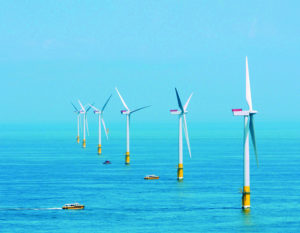 The UK can hit legally binding 2050 decarbonisation targets largely through electrification of heat and transport, but to go beyond that the market will likely require a major restructure, according to consultants Aurora.
The UK can hit legally binding 2050 decarbonisation targets largely through electrification of heat and transport, but to go beyond that the market will likely require a major restructure, according to consultants Aurora.
In a new report, the company envisages a 2050 scenario in which heat and transport are largely electrified. Under this scenario, some 15 million heat pumps are deployed, up from fewer than 250,000 installed to date, and 40 million cars are electric.
It finds low carbon generation must more than triple to 130GW to deliver an electrified economy, but that gas plant will still be required to handle larger winter peaks, as well as gigawatts of storage.
Such an increase in renewables would drive prices to a few pounds per megawatt hour over summer months, according to the report, and see them return to around £60/MWh over winter.
That means thermal plant operators would have to make virtually all of their money over winter – and capacity payments would have to rise north of £40/kW to incentivise new generation, the report finds. The last T-4 auction cleared at £8.40/kW.
As well, too much power on the system over summer would see wind farms instructed not to export to the system much more regularly. National Grid currently makes ‘curtailment payments’ to wind farms, but only around 3% of wind power is calculated to be wasted in this way.
Under Aurora’s scenario that would rise to 30%. Meanwhile annual balancing costs would triple.
Such low summer power prices would require cost reductions of up to 85% if renewables are not subsidised.
All new plant would become increasingly reliant on capacity payments in such a scenario, says Aurora.
The report also looks at pushing towards a net zero carbon target. If finds carbon offsetting and/or carbon capture and storage technologies are required in a zero emissions economy and outlines some options for how the power market may need to be structured under such a scenario.
“To integrate a large buildout of renewables at minimal cost, regulators should aim for a harmonised policy across all technologies,” said Weijie Mak, lead GB power expert at Aurora.
That policy could include an ‘equivalent firm capacity auction’ structure, as outlined in Aurora director Dieter Helm’s recent report for government, whereby all technologies, including intermittent technologies, bid into the same auction and get paid – or penalised – based on what they deliver. The company argues such an approach would incentivise renewable generators to contract for back-up power in case they can’t deliver when required.
See the report here.
Related stories:
Free report: How business plan to deploy battery storage
Aurora: Bring renewables into reformed capacity market to save money
Helm gives government more than they bargained for
Capacity market outtturn a turn off for batteries
T-4 capacity market clears at £8.40, lowest yet
T-1 capacity market auction clears at £6/kW
Medium Combustion Plant Directive takes back-up generators out of DSR
Battery storage cut down to size as gigawatts qualify for capacity market
Half of small generators ‘could give up capacity market contracts’ after Triad cuts
Businesses ‘shutting down from 4-7pm due to peak power costs
Capacity market ‘buying the wrong stuff because it’s joined up with nothing’
Follow us at @EnergystMedia. For regular bulletins, sign up for the free newsletter.



